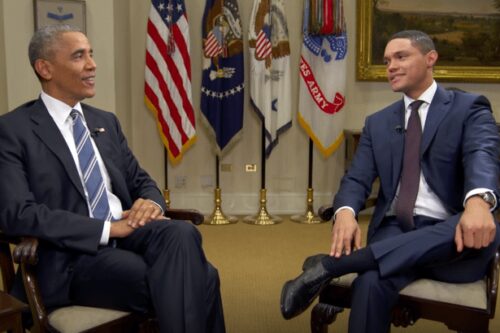Obama: ‘America has not overcome legacy of slavery and Jim Crow’
Share
Explore Our Galleries
Breaking News!
Today's news and culture by Black and other reporters in the Black and mainstream media.
Ways to Support ABHM?
By theGrio

During an interview with Trevor Noah, the host of “The Daily Show,” President Barack Obama spoke about the state of race relations in the United States.
The president noted that, in terms of race, the country “by no means overcome the legacies of slavery and Jim Crow and colonialism and racism.”
“Those who are not subject to racism can sometimes have blind spots,” he admitted when Noah, who is biracial as well and from South Africa, asked him how he approached conversations on race. However, the president noted that just because some people have a “lack of appreciation” for the lived experiences of others does not mean that they cannot learn or do not want to learn about it.
Read the entire article here
Watch the complete interview here
Read more Breaking News here









Comments Are Welcome
Note: We moderate submissions in order to create a space for meaningful dialogue, a space where museum visitors – adults and youth –– can exchange informed, thoughtful, and relevant comments that add value to our exhibits.
Racial slurs, personal attacks, obscenity, profanity, and SHOUTING do not meet the above standard. Such comments are posted in the exhibit Hateful Speech. Commercial promotions, impersonations, and incoherent comments likewise fail to meet our goals, so will not be posted. Submissions longer than 120 words will be shortened.
See our full Comments Policy here.